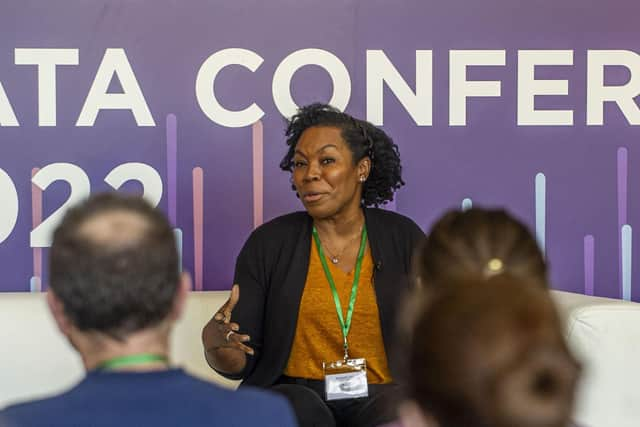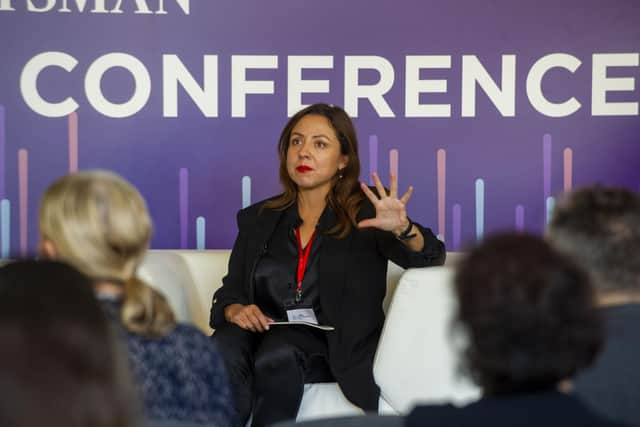Conference report: New data world must bring in the ‘outsiders’
The world is “swimming with information”, but there is a huge imbalance between those involved in making the decisions about how data is collated and deployed, and those outside the loop.
Dr Nakeema Stefflbauer, a technology professional and investor based in Berlin, outlined the differences between “data insiders and outsiders” in a keynote presentation to Data for Diversity – The Scotsman’s annual data conference, presented in partnership with the Edinburgh-based Data-Driven Innovation (DDI) initiative.
Advertisement
Hide AdAdvertisement
Hide AdStefflbauer told the conference that there is a need to redress the balance, to allow those whose data was being collected to understand what it was being used for, and to involve them in designing the data world.


Renata Avila, chief executive of the Open Knowledge Foundation, went further and argued for the digital world to be completely reimagined. It should be rebuilt with real people and communities, not Big Tech and governments, at its heart, she told attendees.
Stefflbauer said: “We are in a world swimming with information. Many digital breadcrumbs are collected, collated and manipulated in a way that will ideally lead to predictive algorithms, which allow us to engage with products and services, jobs and healthcare – specific to our situation.
“There is a sense of inevitability that we get suggestions from Netflix and Amazon [based on data], but this is not conscious or participatory, it’s just happening.”
She added that there is a tendency to see data as “specific and objective”, and therefore perceived as being more authentic than when something was delivered by humans. “That is a fallacy,” she said.


Stefflbauer examined the dynamics beneath both the algorithm, and the data powering the algorithm: “Who is in a position to authorise the data, who is making decisions about it?”
There is a power imbalance, she said, leading to growing “information asymmetry”, which means human beings are increasingly out of the loop: “It’s asymmetry between who is asking the questions, making the decisions and providing the information for an algorithm to be run – and the citizens who are providing a lot of information about their lives.”
These citizens – or data subjects – are “not incorporated into the project”, which makes it “more akin to spying”, Stefflbauer argued.
Advertisement
Hide AdAdvertisement
Hide AdShe added: “The weaponization of human data is happening. The way that we collect data and use data must be more collaborative.”
Stefflbauer then used a series of examples to illustrate her point, including the Stop Spying project in New York, where citizens were involved in the siting of CCTV cameras in neighbourhoods.
“To close the gap, we need to be more participatory, more sustainable and much more conscious – and not allow data to be created and manipulated by faraway people for a function we know nothing about,” Stefflbauer said.
“Data professionals need to remember humans are attached to the data that is used. They are monetising the experience of humans. Those who leverage AI and the data need to consider how they would want their own experiences captured.”
Renata Avila’s presentation – Another Digital Architecture: Designing for Inclusive, Sustainable and Humane Systems – was based on her belief that the current digital world was like a broken building, with access denied to huge swathes of the global population.
“The more vulnerable we are, the less able we are to navigate the complexities of this building – and the more likely we are to be hurt or crushed,” she told the conference.
“The very greedy owners of the building are dictating the rules, and are not interested in the reforms needed. It’s time to say ‘Enough!’ and to create a safer space. Let’s abandon the narrative of a broken system and build a new one.”
Avila argued that the digital empires of today were not inclusive: “They are built on a fraction of the people, resources and possibilities that we have. We must be inspired to build anew, inspired by design principles, with humans and the planet at the centre.”
Advertisement
Hide AdAdvertisement
Hide AdShe went on to outline eight core principles she believes should be at the heart of the “new digital architecture”:
- Universal human rights.
- Building upon other knowledge.
- Participation and accessibility.
- Ability to reproduce and scale innovations in different places.
- Sustainability.
- Ability to activate the creative power of individuals and communities.
- Local roots, but a coherent whole.
- Exponential impact.
“If we follow this, we get into a totally different state of mind, rather than ‘We’re all doomed’,” Avila said.
She went on to tell delegates that the Open Knowledge Foundation practised what it preached, as it was setting standards, creating tools, running training programmes, and working with communities globally to make the change needed for a new digital world.
Asked if this was merely a utopian vision, Avila insisted it was achievable, and that success would depend on prototypes being created, turned into pilot schemes and then embedded. This would need political will, she recognised, but was also about “learning by doing, by making mistakes, and then by scaling.”
She ended by stressing that “hope is a discipline”, saying: “If we remember this, we will overcome all the difficulties we face.”
Avila urged delegates at the conference to take away ideas and share them with different people: “Make that effort to make technical, sophisticated conversations accessible to those outside the bubble.”
Advertisement
Hide AdAdvertisement
Hide AdSummarising the conference, Jarmo Eskelinen, executive director of the DDI initiative, said the balance of high-level aspirational presentations and specific insights had been very insightful.
He added: “We’ve had bold goals to rebuild the internet and also very concrete cases about the gender pay gap – or using financial data to build insights about what’s happening in the real economy in real time.”
He added: “One overarching topic is that data is not good or bad. We can both decrease or increase inclusivity, depending on how we use it.”
Addressing inequalities to offer people a brighter future
A UK Government minister said it was crucial to harness the power of data for better decision making – but the public had to be more involved in understanding why this was happening.
Dehenna Davison, parliamentary under-secretary of state at the Department for Levelling Up, Housing and Communities, said: “Data can be so valuable in levelling up – in identifying disparities and how we can level up.”
She defined levelling up as a way of recognising that talent was equally spread in the UK, but opportunity was not, and finding ways to tackle that.
Davison admitted that the UK Government had a “mixed track record” on data, and insisted it was vital to focus on inclusion, saying: “There is a gap in mutual comprehension between data and the rest of society.”
She added that the focus had to be on using “coherent, reliable, consistent and timely statistics”, and utilising granular data at a local level to “underpin policy making and to identify where government spending will be most useful”.
Advertisement
Hide AdAdvertisement
Hide AdDavison told the conference that a new spatial data unit had been set up in her department, but said there was much more work to do across government: “The job is far from done; the data is not granular or timely enough.”
But, she said, if harnessed effectively, data had real power to “address inequalities and offer people a brighter future”.
